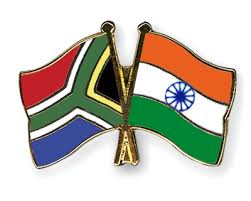Trade and business links between South Africa and India will get a welcome boost from President Cyril Ramaphosa’s visit to Delhi this week.

President Ramaphosa’s presence as the chief guest at India’s Republic Day celebrations burnishes an already solid relationship between the two countries and focusses attention more broadly on the powerful ties between the continents in which they reside.
Trade in wood, spices and precious stones between India and Africa has thrived pretty much since sailors traversed the seas. South Africa’s Mapungubwe kingdom, a settlement close to the borders with Zimbabwe and Botswana, offers evidence of trade between people living in southern Africa with nations from across the Indian Ocean from as long ago as the 12th century.
Fast forward to today and the trade between India and Africa has grown to $53 billion and is expected to reach $150 billion by 2023, with $20 billion of this amount expected to come from trade between India and South Africa alone. India is among the top five investors in Africa and given South Africa’s role as a gateway economy to the rest of the continent, the two nations are natural allies in a range of sectors,” says Rohit Wahi, CEO of FirstRand India.
While Africa and the Indian sub-continent have striking similarities in population size, GDP and economic demography, the diversity between the two complements their needs. Spices, timber and precious stones have been augmented by crude, petroleum products, pharmaceuticals, automobiles, motorcycles and commercial vehicles. Large Indian groups such as Tata, Mahindra, L&T, Cipla, Bharti, Godrej and Marico have made meaningful investments in Africa while state-owned corporations such as Rites, Coal India and ONGC are among those participating in the extractive sectors and large-scale construction projects.
Says Wahi: “Strengthening bilateral ties between India and South Africa offers businesses in both countries greater scope for expansion. FirstRand, the only African bank with a branch license in India, is celebrating 10 years of successful operations this year and provides an apt example of the kind of business links that should be encouraged. Firstrand leverages their presence in Africa, as well as in India, to provide advisory, investment banking and transactional banking services across a wide range of sectors in the Indo-African corridor, as well as to Indian corporates in the domestic market.”
South Africa boasts developed financial markets, a variety of established sectors and large corporate groups that are seeking international expansion opportunities. Some of the business models and technical capabilities of South African companies, especially in financial services, could be deployed in India at a significantly larger scale. It is no coincidence that South African expansion into India has been dominated by financial institutions with FirstRand Bank, MMI and Sanlam having deployed significant capital and expertise towards their Indian operations.
Another noteworthy partnership is that of the Airports Company South Africa, a shareholder and technical partner in Mumbai International Airport which was rated the Best Airport in Asia Pacific at the ASQ Awards 2018.
On the technology front, Naspers has made sizeable investments in India in several online platforms across the travel and retail sectors. India offers manufacturing synergies from a cost and efficiency perspective and several pharmaceutical manufacturers in South Africa use India as an outsourced manufacturing destination.
“India is poised to become the 2nd largest economy on a PPP basis by 2030 and South Africa is the gateway to Africa. This provides tremendous opportunities to companies in both countries to capitalise on the exponential growth of the two geographies,” concludes Wahi. “The FirstRand Group believes in the India story and has positioned itself as the banker of choice in the Indo-Africa trade and investment corridor. Our continued investment in our Indian franchise ensures that we are able to optimally serve our customers in a market that is very important to us.”
